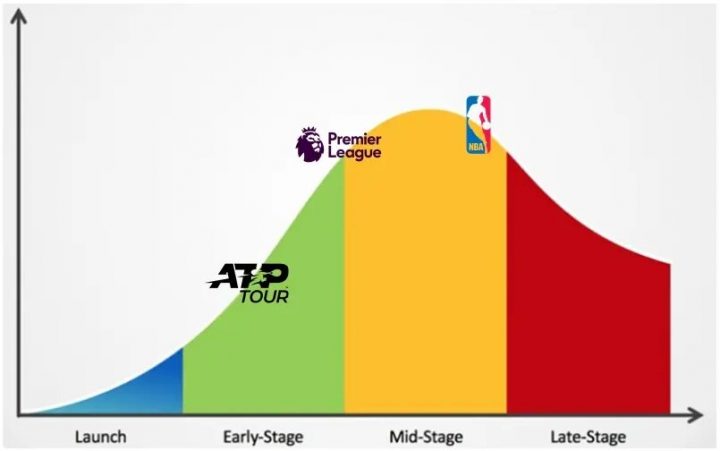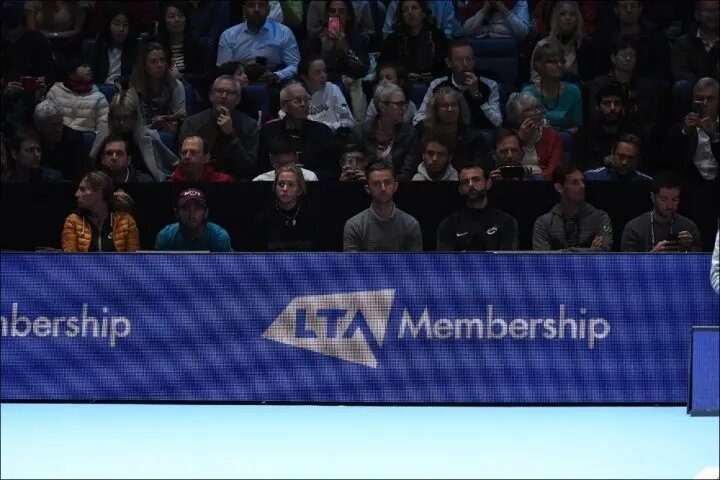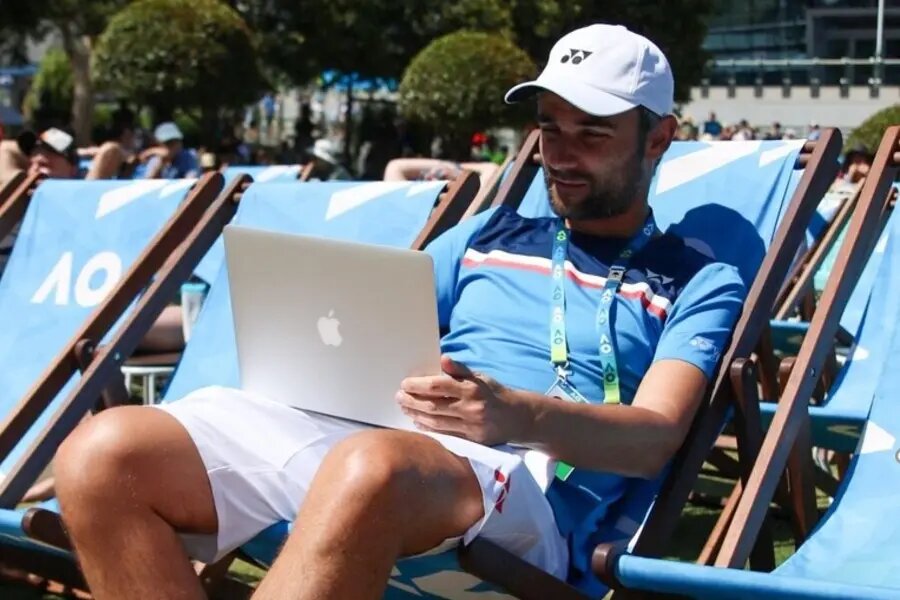Written by Federico Bertelli
There is a little known story that is worth telling: the story of Fabrice Sbarro, data analyst, creator of the Tennisprofiler website and tennis trainer (in strict order) who took part in Daniil Medvedev’s pyrotechnic 2019 summer performance, together with his historical coach Gilles Cervara.
We interviewed Fabrice via Zoom during these COVID days, and in the end we got so much material that we decided to divide it into three parts: in a first part we outline the story of Fabrice and how he entered in the Medvedev team, in the second part we will tell some background on the incredible Russian summer seen by an insider. The third part will be dedicated to some thoughts about data in tennis and beyond.
The full interview anyway is available at this link and below is a list of some highlights of the video interview:
- the beginning of the collaboration with the Medvedev team (at 5:50 minutes)
- the backstage of Wawrinka-Medvedev, Australian Open 2020 (15:13)
- the rise of Berrettini (19:54)
- the collaboration with Mahut at the London Masters 2019 (9.50pm)
- Murray (31:40)
CHAPTER 1 – THE BEGINNING
We have a very interesting story about a Swiss boy who perhaps was ahead of his time. And these days of no tennis played, ideas and insights are even more welcome. First let’s frame the character: Fabrice Sbarro, a 40-year-old Swiss that has been carrying out statistical analysis on tennis courts with match charting for the last 13 years. Sbarro has always had a passion for tennis but unlike other peers he has started coaching at ITF and WTA level very early, in his early 20’s. Fabrice has tried it all, but the world of tennis is not only about the scintillating legend we all know. And it is not even only about the realm of the top 10 or of all those brave professionals who battle for their professional life to stay in the top 100.
Tennis is also a purgatory made up of challengers, futures and national tournaments with prize money of a few thousand euros. A mountain to climb one step at a time, made of many slopes that must be overcome in order to access tennis elite. Among his clients Mr. Sbarro was also able to coach a future WTA top 150; in the end he was very close in getting it right and reach the very top of the game, but in the end he was not able to take that final little decisive step. For years, therefore, Fabrice has tasted all the bittersweet of the secondary tournaments, putting in a lot of passion and effort, sometimes driving cars for hours, only to see his player losing in the first round.
The pieces of the puzzle needed for leading a good player to the world’s very best are a lot and few times they fit together, and unfortunately this was not the case for the players trained by Fabrice.
All this activity, however, which has lasted for over a decade, has not been useless because it has prompted the Swiss coach to search for a new path to success. And this research led him to the world of data analysis to obtain a practical framework. The idea was to map tennis matches, to create a significant database on which to build his coaching analysis. A really tall order (tennis nerds will surely know the match charting project by Jeff Sackman, conceived as a community effort of dozens of fans. The concept is similar, but in this case the effort is made by one person).
However, little by little, this idea that arose almost by chance in the mind of Fabrice, became more and more central: and in the end Mr Sbarro came to a conclusion: stop striving for success through direct coaching, without a real prospect of success. And it was not easy at the time, because at the beginning – over 10 years ago – he was seen by his colleagues as an alien or a crazy person. But he took the challenge more and more seriously and made it the core of his business. And the further he went, the more the Swiss became aware of the potential of his work, especially considering what is happening in other professional leagues.
Data analysis in other sports over the years has become a tool needed to compete, as happens in the NBA – a sport that it has now become the realm of advanced statistics. The shooting map in NBA parquets has changed dramatically in the last 5 to 10 years. If we try to represent the advanced statistics as a product and we wanted to describe the degree of maturity in the different sports, probably the situation would be a graph like this:

In tennis we are clearly behind other sports such as football or basketball. In football, for example we can look at Liverpool that reached two consecutive Champions League finals. A small (?) Part of the credit for this result also goes to its cutting edge team of data scientists. Or on a more advanced stage of the curve we find the NBA where the moneyball paradigm has now become widely established.
In the end, Fabrice decided to make statistical analysis its full-time business. As of the beginning of 2020 Fabrice has recorded more than one million points (to give an idea, during the iconic Wimbledon 2019 final, lasted 5 hours, 422 points were played; applying the rule of thumb we can say that tracing a million points implies an estimated effort of 12,000 hours of work). And in pursuing this effort Fabrice has focused on the ATP and WTA elite, or the top 100 in the ranking of the last few years, in order to build a solid and significant database. In short, one brick at a time, Fabrice began to make himself known, moving from scepticism to curiosity and finally to the deserved attention. We are therefore ready for the second part of this journey, in which hard work has begun to pay dividends and in which the pieces of the puzzle finally begin to fall into place. We are ready to rewind the tape and go to Montreal’s ATP tournament in July 2019.
CHAPTER 2 – THE CRAZY SUMMER of 2019
This is arguably the most enjoyable part of the interview, the fabulous summer of 2019. Try to imagine yourself putting yourself in Fabrice’s shoes. You worked hard to earn the right to have an opportunity, but for years not even a glimpse. You have continued the coaching activity for over a decade, hoping to find the real crack, a player who could have reached the top 100. But without success. Then deciding to invest fully in this new activity, going big with data analysis and deciding to change your business card: from coach to data analyst. Yes, it is true, the first contacts begin even before 2019, but still some pieces are not connecting as they should.
So, in the summer of 2019, when the last job relationship as coach of a player at ITF level expired, during a course in Switzerland Fabrice met Gilles Simon’s coach, Etienne Laforgue, a neuroscience expert. For a couple of years, the 35-year-old French tennis player had trusted this new coach in order to improve the biomechanical imperfections of his game and thus extend his career. Sbarro’s idea on that occasion was simply to do some networking and find a complement to his work. Instead Laforgue unexpectedly gave him the opportunity he has been waiting for: “Why don’t you take some kind of roadshow among people in the ATP Tour to present your works? I can introduce you to some coaches I know. “ And so, two weeks after this chat, it is time to prepare the backpack, and get a flight ticket to Montreal: it is the year in which the Canadian Masters 1000 is played in the most famous francophone city of the country.
As Fabrice tells us (from the minute 5:50 of the interview), out of nowhere, he finds himself into an elite tournament, with the best 50 players in the world. He knew very well those guys, but only on paper, after having spent thousands of hours studying them. And here comes the big occasion for Fabrice, while crossing the path crosses of Gilles Cervara, the coach of Medvedev, who grants him an audience. Sbarro thus presents his methodology and Cervara was intrigued by the pitch. Cervara is in fact a coach open to innovation and Fabrice is a perfect fit for Cervara’s needs: someone who knows how to read data by providing actionable insights, allowing to optimize the process of match preparation.

Gilles Cervara in the box of Daniil Medvedev – ATP Finals 2019 (foto Roberto Zanettin)
“Ok Fabrice, I’ll give you a shot, let’s try to prepare Daniil’s next match with Kyle Edmund.” The two turn out to collaborate in the preparation of a match by examining the statistical ideas produced by the Swiss analyst. The match we are talking about is the second round match between Medvedev and Edmund, a tough opponent, ranked in the top 30s, who dispatched the day before Nick Kyrgios, who won Washington at the beginning of the American swing against Medvedev. The game ends 6-3 6-0. After the match, Sbarro’s phone rings: it’s Cervara. “Ok Fabrice, we have to talk, for this tournament we will prepare all Daniil’s matches together”. The Russian’s next matches will be Garin, Thiem and Kachanov. Result: three wins, six sets won, 0 lost and first final for the Russian in a Masters 1000 against Nadal. Nadal in that occasion was too strong, but still an impressive run for the Russian.
Let’s recap: seven days earlier Fabrice was flying to Canada armed only with his own ideas. Now he has managed to join a top player team and make his contribution to help him reach the final in a Masters 1000. After Montreal, Cervara invites the boy from Switzerland to help him also for the following tournament, the second Masters 1000 of the American summer, the Western and Southern Open. Cincinnati is a tournament that sometimes holds surprises, like in 2017 when Kyrgios and Dimitrov met in the final. In 2019, the surprise is Medvedev, who beats Djokovic in an incredible match that grants him the access to the final, and gave him the momentum to get rid of Goffin in the final to raise the first 1000 trophy of his career. To make a long story short, Fabrice undoubtedly found himself in the right place and at the right time, helping Medvedev to become the man to watch in the 2019 summer.
But maybe it is better to listen to Fabrice’s own words:
“Obviously I have only made a contribution in all this, it was Daniil who stepped in on court; however, I think I helped him in taking on the last step that sometimes makes the difference. Let’s put it this way, I gave my contribution so that Daniil could improve his performance by the marginal 1% he needed to really break through.”
In short, after Cincinnati the wind has definitely started to change for Fabrice: during the US Open, the collaboration relationship with the Medvedev team was not yet exclusive and, in the meantime, also the Wawrinka team had asked a test with the Swiss analyst. But would you believe it? The Wawrinka-Medvedev showdown was scheduled in the quarterfinals, and therefore Fabrice had to politely decline the request of the Stananimal team: who would have said it just a couple of months before, Fabrice was refusing to collaborate with a 3 times Grand Slam winner!
The second part of our interview with Sbarro will be published later this week!



 Hot Topics3 days ago
Hot Topics3 days ago
 Latest news3 days ago
Latest news3 days ago
 Hot Topics2 days ago
Hot Topics2 days ago
 Hot Topics3 days ago
Hot Topics3 days ago
 Focus2 days ago
Focus2 days ago
 Focus2 days ago
Focus2 days ago
 Focus2 days ago
Focus2 days ago
 Hot Topics2 days ago
Hot Topics2 days ago





























